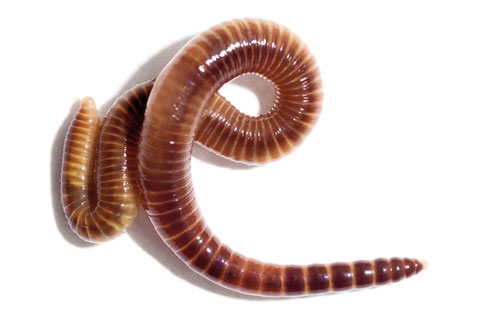4/1/2019
As the Worm Turns
John Johnston

With a little luck, spring is finally springing where you are and the deep freeze of winter is slowly receding in our collective memory. Even during those cold months, though, one of Earth’s most interesting creatures is still diligently at work. I’ve never known a manufacturer that worked 24-hours-a-day, 7-days-a-week to provide an energy tonic that we sell to garden centers nationwide—until now. Consider the mighty earthworm.
Earthworm castings are gaining popularity among gardeners who prefer an all-organic balance of nutrients, including nitrogen, phosphorous and potash. Did you ever imagine that the subject of your grade school dissection project in science class would become a factor in feeding the world? Me neither.
Earthworms play a major role in turning organic matter into rich, usable humus. Did you know that earthworms are a $54 million dollar industry? As a child, I only thought of worms as the bait at the end of a fishing line. But there’s so much more to know.
The earthworm feeds on both organic and dead matter in the soil. While earthworms are abundant in the United States, research has shown that they’re vulnerable to lime sulfur, DDT and lead arsenate. Recent studies have shown that neonicotinoid insecticides like imidacloprid (Merit) severely damage populations of earthworms; recent restrictions have tightened up on its application and use in many states.
Protecting the health of the earthworm ensures healthier soil. Earthworms will thrive wherever there’s moisture, food (organic matter), oxygen and favorable temperatures. They’re contributing garden workers in other ways, too.
Earthworms are very beneficial to gardeners in distributing specific beneficial nematodes that are usually applied in to the lawn or garden in spring. These spores are ingested into their digestive system and spread laterally in their ecosystem, eradicating many sub-soil insects that are harmful to gardens and crops. The Japanese beetle is one such grub that’s destroyed by released bacteria spores when in the larvae stage — truly a better solution than applying chemicals to your lawn, especially around pets and children.
For years, farmers have encouraged earthworm burrows as their constant tunneling aerates the ground to allow for better root development and easier moisture retention; their casting deposits also fertilize the soil. Earthworms are known to accelerate the decomposition process of composting, too. Tireless workers that constantly move and never sleep, earthworms are hermaphrodites, which means that each have both male and female sex organs, but they still need “two to tango” in order to reproduce.
Many new retail products include earthworm castings as a supplemental ingredient. These can be mixed with potting soil, top-dressed onto soil surfaces or even steeped in a barrel for a magical compost tea. Castings may be applied indoors or outdoors, and they won’t burn. Worm castings stimulate faster growth, increased biological activity and bigger yields in plants.
If you’ve got customers who wish to start their own worm farms, consider adding live worms to your soil amendment lineup. Producers such as Orcon Organic Control can ship directly to your store in packages of roughly 1,800 to 2,000 worms per pound in all stages and sizes. Just drop into a compost pile and they’re off to soil utopia!
As a child, I never realized how beneficial the earthworm truly was. As a gardener, however, I understand Mother Nature has given us an amazing creature with magical powers. I’ll never look at the earthworm in the same way again. GP
John Johnston is Retail Education Manager for Griffin. He can be reached at jjohnston@griffinmail.com.